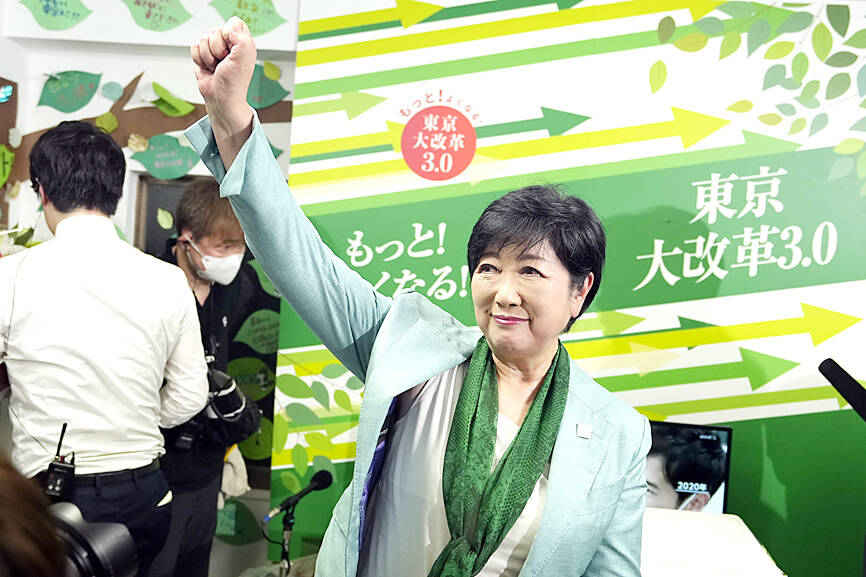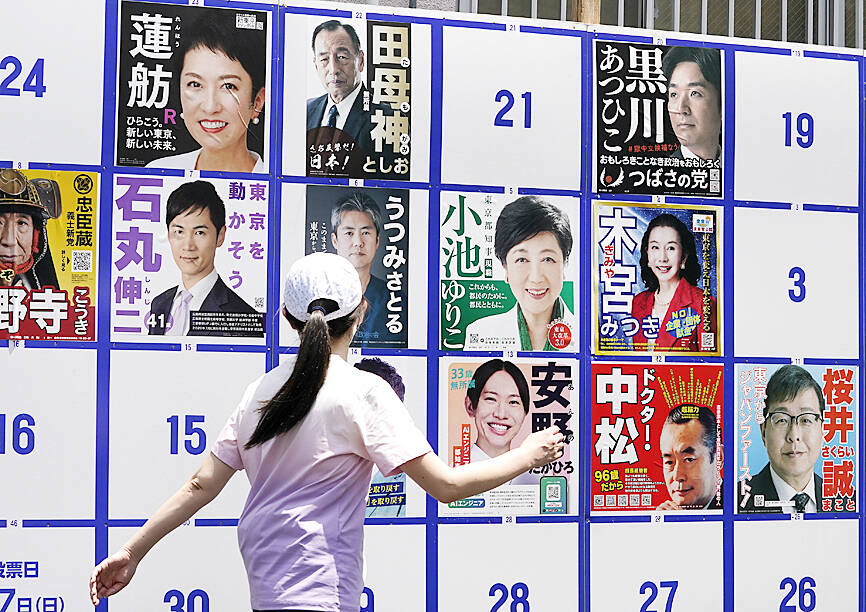Tokyo Governor Yuriko Koike was yesterday projected to win re-election as head of Japan’s influential capital for a third four-year term, according to exit poll results by Japan Broadcasting Corp (NHK).
Yesterday’s vote was also seen as a test for Japanese Prime Minister Fumio Kishida’s governing Liberal Democratic Party (LDP), which supports the first woman to lead the Tokyo city government.
The city of 13.5 million people with outsized political and cultural power, and a budget equaling some nations, is one of Japan’s most influential political posts.

Photo: AP
A record 55 candidates challenged Koike, and one of the top contenders was also a woman — a liberal-leaning former lawmaker who uses only her first name, Renho, and was backed by opposition parties.
Renho was born to a Japanese mother and Taiwanese father.
Minutes after the NHK exit poll projecting her victory, Koike arrived at her campaign headquarters in Tokyo and celebrated by thanking the voters who chose her.

Photo: EPA-EFE
“I believe the voters gave me a mandate for my accomplishment in the past eight years,” Koike said, pledging to push for more reforms and support for Tokyo residents.
“I’m fully aware of my heavy responsibility,” she said. “I will tackle my third term with all my body and soul.”
A win by Koike would be a relief for the LDP, which she has long been affiliated with. The party and its junior coalition partner, Komeito, unofficially backed her campaign.
Renho, running as an independent, but supported by the main opposition Constitutional Democratic Party of Japan and the Japanese Communist Party, criticized Koike’s connection with the LDP, which has been hit by a widespread slush fund scandal.
A victory for Renho would have been a major setback for Kishida’s chances in the party’s leadership vote in September.
While the two high-profile women gathered national attention, Shinji Ishimaru, a former mayor of Akitakata in Hiroshima Prefecture, was seen to have gained popularity among young voters.
The main issues in the campaign included measures for the economy, disaster resilience for Tokyo and low birth numbers.
Koike’s policies focused on providing subsidies for married parents expecting babies and those raising children.
Renho called for increased support for young people to address their concerns about jobs and financial stability, saying that would help improve prospects for marrying and having families.

AT RISK: The council reiterated that people should seriously consider the necessity of visiting China, after Beijing passed 22 guidelines to punish ‘die-hard’ separatists The Mainland Affairs Council (MAC) has since Jan. 1 last year received 65 petitions regarding Taiwanese who were interrogated or detained in China, MAC Minister Chiu Chui-cheng (邱垂正) said yesterday. Fifty-two either went missing or had their personal freedoms restricted, with some put in criminal detention, while 13 were interrogated and temporarily detained, he said in a radio interview. On June 21 last year, China announced 22 guidelines to punish “die-hard Taiwanese independence separatists,” allowing Chinese courts to try people in absentia. The guidelines are uncivilized and inhumane, allowing Beijing to seize assets and issue the death penalty, with no regard for potential

STILL COMMITTED: The US opposes any forced change to the ‘status quo’ in the Strait, but also does not seek conflict, US Secretary of State Marco Rubio said US President Donald Trump’s administration released US$5.3 billion in previously frozen foreign aid, including US$870 million in security exemptions for programs in Taiwan, a list of exemptions reviewed by Reuters showed. Trump ordered a 90-day pause on foreign aid shortly after taking office on Jan. 20, halting funding for everything from programs that fight starvation and deadly diseases to providing shelters for millions of displaced people across the globe. US Secretary of State Marco Rubio, who has said that all foreign assistance must align with Trump’s “America First” priorities, issued waivers late last month on military aid to Israel and Egypt, the

‘UNITED FRONT’ FRONTS: Barring contact with Huaqiao and Jinan universities is needed to stop China targeting Taiwanese students, the education minister said Taiwan has blacklisted two Chinese universities from conducting academic exchange programs in the nation after reports that the institutes are arms of Beijing’s United Front Work Department, Minister of Education Cheng Ying-yao (鄭英耀) said in an exclusive interview with the Chinese-language Liberty Times (the Taipei Times’ sister paper) published yesterday. China’s Huaqiao University in Xiamen and Quanzhou, as well as Jinan University in Guangzhou, which have 600 and 1,500 Taiwanese on their rolls respectively, are under direct control of the Chinese government’s political warfare branch, Cheng said, citing reports by national security officials. A comprehensive ban on Taiwanese institutions collaborating or

France’s nuclear-powered aircraft carrier and accompanying warships were in the Philippines yesterday after holding combat drills with Philippine forces in the disputed South China Sea in a show of firepower that would likely antagonize China. The Charles de Gaulle on Friday docked at Subic Bay, a former US naval base northwest of Manila, for a break after more than two months of deployment in the Indo-Pacific region. The French carrier engaged with security allies for contingency readiness and to promote regional security, including with Philippine forces, navy ships and fighter jets. They held anti-submarine warfare drills and aerial combat training on Friday in